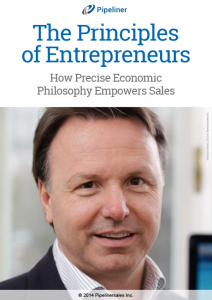by Nikolaus Kimla, CEO, Pipeliner Sales
Definition of Management
So what is management, really? Is it just ordering people around and enforcing deadlines for goals set for your team or company? Or is there something more to it?
It is my deepest belief that the Malik Management Approach answers these questions perfectly, and creates a system that can in fact helps everyone within it to become an entrepreneur or manager, and transform their own individual strengths into a seamless team performance.
Let me explain the Malik Management Approach to you in detail.
Holistic Understanding of Management
The term holistic is derived from the ancient Greek word “holos,” which means “all” or “everything.” So, what does holistic understanding of management mean? It means you understand the system you are operating within as a whole. It is not enough to understand each separate part of this system in a vacuum.
Holistic understanding means to view any system as a complex network of actions and reactions, that works towards one result. The quality of this result is based upon the effectiveness of the cooperation between all of the processes within the system, rather than only the effectiveness of each individual process.
Because the Malik Management Approach is based upon this holistic understanding, it delivers sound solutions that can be applied to every possible level or form of management.
Role of Management in Society
The Malik Management Approach expands the concept of management beyond the exclusive environments in which it is commonly studied—finance and the business world. It sees management as a key function within any social organization, as well as an aspect of everyday life.
This perspective is explored in detail in Fredmund Malik‘s bestselling book Managing Performing Living. It contains the knowledge and tools that should always be available and ready for use in all organizations – in companies as well as in various other institutions and organizations in society.
The Malik Management Approach views good management as a social function – one which enables the organizations and systems of a society to function properly.
Malik Management Approach
Today there are many more people dealing with management—and having to handle management tasks—than at any other time in history. The systems we live in are getting more complex and complicated every single day. Without proper skills and knowledge, we are bound to make mistakes that can affect not only our business or career success, but our day-to-day lives.
- Management is the moving force that allows people to reach a common goal — sharing work and knowledge.
- Management is the organ of leadership in social systems and institutions – from business enterprises to universities, cities, and all other organizations.
- Management must give direction to the organization based upon set goals, and be able to adjust its objectives and processes accordingly. It has to organize the resources to match the requirements of the objectives and goals.
Management as a System
One of the biggest challenges of management is to follow and handle the increasing complexity of systems and social organizations. Based on its import and impact, we can compare management to the operating system of a computer. Prof. Malik understands management as an “operating system” capable of evolving and matching any organization of any size and type.
Within this operating system, every person has a space tailored for his or her individual abilities, and skill that does not just allow them to work towards a common goal, but also allows them to function as an entrepreneur.
Management as a Skill
Managers or executives are the ones who embody the social function of management, and practice it as a profession. Part of this means doing the right thing for an organization, and doing it well. That is why the Malik Management Approach sees management as the profession of effectiveness in complex systems. This sets managers apart, and requires them to use more than just financial resources; they must utilize talent, intelligence, creativity, information, knowledge, and insights — all transformed into results.
Management must be learned just like any other profession, a foreign language, or a type of sport. Management is not simpler or easier than these and it must therefore be practiced. However, neither is it more difficult and anyone can achieve a certain degree of competence, higher than that of an amateur, and many can become highly professional. The fact that there are people who have more of a talent for management than others does not alter the possibility or the necessity of learning management. Related to this is the need of criteria and standards, such as have been developed by every profession. However, in management these are practically non-existent to date.
— Fredmund Malik
The Great Transformation
One of the newest concepts within the Malik Management Approach is the theory that the recent financial crisis, at its peak in 2011, was not just a depression, but in fact part of a huge social transformation process taking place on a global scale. The world of socialism and capitalism is coming to an end, and a new world and new way of thinking is slowly emerging.
A new term, “humane functionalism,” redefines the role of people within this new world of economics, and frees them from the conceptual prison of the old polarity of capitalism and communism.
Fredmund Malik
Fredmund Malik is a renowned expert in Complexity Management, Governance, and Leadership, that has authored and researched many topics within his field of expertise. His theories and new ways of thinking have been implemented all around the world, in many different aspects of business, industry, and other types of organizations. Thanks to his work, top leaders have been empowered to master complexity and the dynamic new challenges of the 21st century. His innovative tools take over where conventional management stops.
In 1984 Malik published his first classic on management cybernetics (management viewing organizations as precise structures with predictable responses and actions), Strategy of the Management of Complex Systems. That same year he founded the Malik Institute in St. Gallen, Switzerland, which he heads as Chairman and CEO. The Institute has been among the leading knowledge organizations for management solutions ever since.
Malik’s work has been very well received within academic circles. He was Professor of General Corporate Management, Governance, and Leadership at the University of St. Gallen, Switzerland (1974 – 2004), and a Guest Professor at the Vienna University of Economics and Business(1992 – 1998). He earned his doctorate and his habilitation (the highest academic qualification achievable in European universities) in managerial economics.
Publications
Fredmund Malik is a well-known writer and entrepreneur, and is the author of many successful books and publications:
- Maucher and Malik on Management, 2013
- Managing Performing Living, 2006, 2012
- Series: Management: Mastering Complexity, Volume 1-3
- The Right Corporate Governance, 2012
- Uncluttered Management Thinking, 2011
- Bionics – Fascination of Nature, 2007
Managing Performing Living
This book became a bestseller quickly after it was released in 2006, and was voted one of the top 100 business books in 2011.
Managing Performing Living offers sound and proven tools, and professional advice, for successful management in any organization. Malik emphasizes the improvement of skills within the organization, decision-making, supervising, budgeting, and numerous other management-related tasks. Even though this book is highly regarded within the business world, it is not written just for business and industry managers – it helps students of management, public and university administrators, and executives in other types of organizations. It can be studied independently or as a companion volume to Malik’s Management: The Essence of the Craft.
Managers who want to come to a critical review of their management behavior and management system will find no other book that is more stimulating.
— Manager Magazine, Austria
Uncluttered Management Thinking
Communication is what drives an organization forward, and it is also one of the most important skills a successful manager must wield. Language is in fact one of the foundations of abstract thinking and problem solving. In this book, Malik explores problems that can arise from wrong and cluttered language in management.
Unprofessional and inaccurate definitions of terms within the organization can lead to many unforeseen problems and bad management. Malik offers detailed analyses of the psychological, management, and economic errors managers tend to make, and explains how such errors can be avoided—for clear language is a key to right and good management.
Malik demonstrates how, in extreme cases, the wrong use of fashionable terms can even lead to entrepreneurial disaster.
— Wirtschaft & Markt
Malik Institute
Founded in 1984 by Fredmund Malik himself, the Malik Institute has now become one of the world leaders in management training, with offices in St. Gellen, Zurich, Berlin, Vienna, Beijing, Toronto, and London.
Based on Malik’s deep understanding of the world of management, Malik Institute has helped tailor management systems and organizational structures for many successful businesses and industries worldwide.
Importance of Malik to Pipeliner Sales, Inc.
I don’t just talk about Malik and his Management Approach idly—we have employed his management principles very thoroughly at Pipeliner CRM.
I believe you can have the best product in the world (and we do!), but if the company is not managed correctly, you can still fail on a grand scale. Within a growing company such as ours, management is one of the most important challenges we face.
Looking at the Malik model, we found it to be the right approach in efficiently managing a rapidly growing group of people. As far as management systems out there today, it is the best of the best.
We have also found that when we bring in new people for specific management positions, they bring with them their own ideas and mindsets about management systems, even their own management languages. We need to be able to communicate to everyone on the same level, and have everyone be on the same page. To this end we have established our own internal school of management, through which we train people on the Malik Management Approach.
To learn how we are applying the principles of Malik and others, download and read our free ebook Leading from the War Room: Building a Battle-Ready Sales Force.


